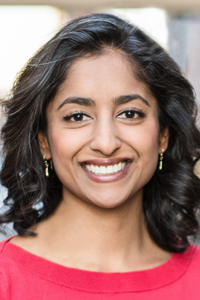Don't see what you're looking for?
Main Site
Berklee.eduCampuses and Schools
Pooja K. Agarwal
For media inquiries, please contact Media Relations
Pooja K. Agarwal is committed to bridging the gaps between cognitive science, classroom teaching, and education policy. Passionate about evidence-based education, she has conducted learning and memory research for more than 10 years. Agarwal also has extensive K–12 and university teaching experience. Her work has been featured in popular publications, including the New York Times and Education Week. Her research also has been highlighted in books, podcasts, and academic journals.
- Published articles in Applied Cognitive Psychology, Journal of Experimental Psychology: Applied, Educational Psychology Review, Applied Cognitive Psychology, and Journal of Applied Research in Memory and Cognition
- National Science Foundation Graduate Research Fellowship
- Harry S. Truman Scholarship
- Washington University Undergraduate Research Grants
- Recipient of American Psychological Association (APA) Graduate Researcher Student Award
- Recipient of Illinois Mathematics and Science Academy (IMSA) Alumni Titan Award
- Ph.D., Washington University in St. Louis
- M.A., Washington University in St. Louis
- B.A., Washington University in St. Louis
- Teaching Certification
“I aim to transform education via evidence-based learning strategies and methods. As a scientist, I apply my expertise when translating cognitive science for educators, students, and the public. As a former K–12 teacher, I am familiar with the challenges that educators face, and accordingly, I strive to provide classroom recommendations that are practical and straightforward. Lastly, as a policy maker, I am mindful of the complexities that shape curricula, evaluation, classrooms, districts, states, and higher education.”
“Learning is successful when students are inspired to apply their knowledge gained from inside the classroom to their lives outside the classroom. Without this bridge from school to life, learning remains dormant and meaningless.”
“I am passionate about harnessing the science of learning to improve education. My research as a cognitive scientist informs my teaching and my teaching experiences inform my research. Although surprising to many of us, the science of learning exists. As educators dedicated to fostering learning, now is the time to unleash it.”
